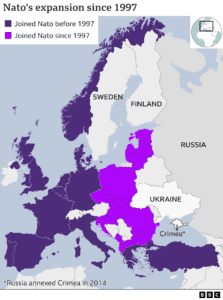Overview of Sweden-Finland Joining NATO
Context:
- With the Russian invasion of Ukraine nearing three months, Sweden and Finland (SweFin), the two Nordic countries that have historically stayed out of military alliances, have formally applied to join the North Atlantic Treaty Organization (NATO).

Background:
- The Swedish Norwegian War, fought in 1814, was Sweden’s last war. Russia had invaded the Baltic Sea island of Gotland six years prior.
- While the Swedes pushed the Russians off the island, the latter retreated, taking Finland with them.
- Sweden adopted neutrality as the cornerstone of its foreign policy following the Swedish-Norwegian war because it fitted its interests better in an increasingly hostile neighbourhood.
- It remained neutral during both World Wars and the Cold War.
Why the sudden change?
- Sweden and Finland, unlike Ukraine, do not have a boundary dispute with Russia. However, until the 2014 political transition in Kyiv, Ukraine had no serious war with Russia.
- As a result, the Russian hack seems to have changed SweFin’s security calculation.
- They moved fast to apply for NATO membership in the hopes of using the organisation as a deterrent against future attacks. Sweden and Finland have established strong relations with the West. Both countries are European Union members.
- Their NATO ties are the closest two non-members can get to the organisation. They participate in joint military exercises with NATO, share intelligence, and have backed NATO military missions around the world.

Why opposition from Turkey?
- Turkey’s President Recep Tayyip Erdogan has stated repeatedly that Turkey will oppose Sweden’s NATO membership quest.
- Decisions in NATO are made unanimously, which implies that each of the bloc’s 30 members has a veto.
- Turkey claims that Sweden and Finland are linked to “terrorist” groups such as the Kurdistan Workers Party (PKK) and the People’s Protection Units (PPU) (YPG).
- Since the mid-1980s, the PKK, which seeks greater autonomy for Turkey’s Kurdish minority, has maintained an armed insurgency.
- The YPG is Syrian Kurdistan’s armed branch, which controls parts of Syria’s Kurdish territory.
- In the Kurdish territory, Turkey is accused of major human rights breaches.
Way Forward:
- If Turkey follows through on its threats and denies the SweFin bid, it will put the Nordic nations in a tricky position: they have already given up neutrality, yet they will not be protected by NATO.
- Even if the proposal is approved, the formal induction of these countries into the alliance will take time.
- The procedure took 20 months in the case of NATO’s most recent enlargement, when North Macedonia was accepted to the alliance in March 2020.The procedure took 18 months in the instance of Montenegro, which joined NATO in June 2017.
Source: THE HINDU.
For more update, click here to join our telegram channel




